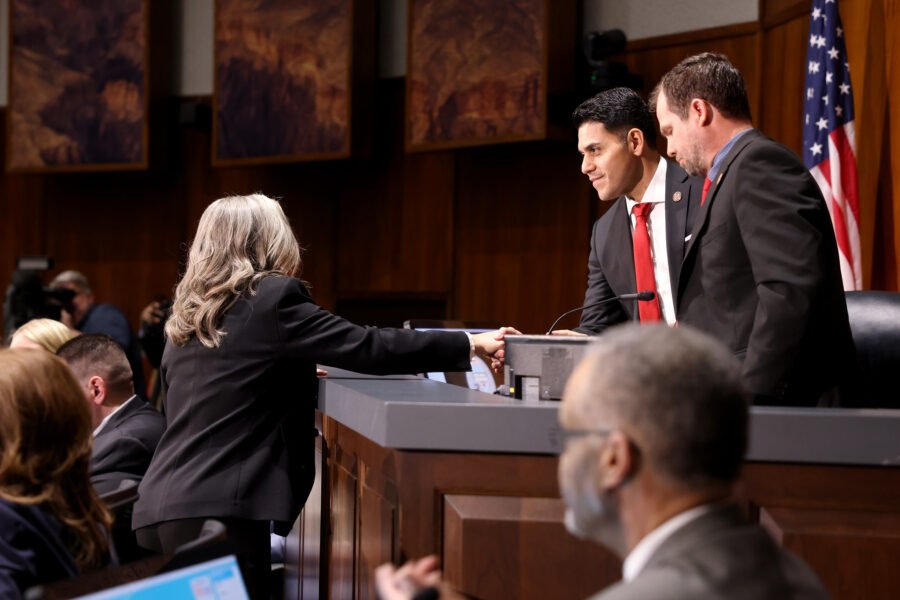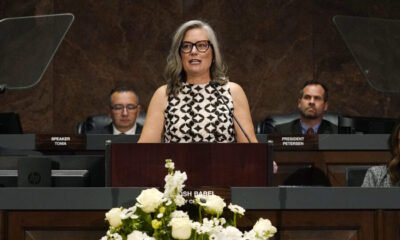budget
Governor’s Office Joins Forces with Senate Republicans for Budget Breakthrough

Lawmakers in Arizona are at an impasse over how to allocate a $270 million surplus, just weeks before the end of the fiscal year. Governor Katie Hobbs anticipates reaching a budget deal soon, despite ongoing discussions.
The House adjourned until June 16 after a few votes on June 4, maintaining a sporadic legislative schedule while leaders negotiate. Both the House and Senate need to finalize a budget that Hobbs can approve by the June 30 deadline.
“I believe we can accomplish it before the end of the fiscal year,” Hobbs remarked during a press conference on June 5. Although legislative leaders are nearing an agreement, the two chambers remain divided on spending priorities.
Hobbs noted alignment with Senate Republicans on some points, but significant differences with House Republicans persist. “It’s frustrating that despite all the time available, the House and Senate are still not aligned,” she stated.
House Speaker Steve Montenegro, R-Goodyear, offered little clarification during the recent session, acknowledging ongoing discussions without providing details. Following the session, he was unavailable for additional comments.
A House GOP spokesman indicated that the chamber might reconvene before June 16 if a budget agreement is reached sooner. Senate Appropriations Chairman John Kavanagh, R-Fountain Hills, expressed concerns about the unusual negotiation dynamic, noting this is the first instance of the House not collaborating closely with the Senate.
Kavanagh confirmed a plan to split the surplus almost evenly among the Governor’s Office and both legislative chambers, each receiving around $90 million. This strategy contrasts with earlier projections of a $612 million surplus, which were revised downward due to federal uncertainties.
Reported differences in funding allocation highlight conflicting approaches to spending the legislative share. Senate Republicans favor a method akin to last year’s, allowing individual members discretion over their funds. Meanwhile, House Republicans seek to consolidate their allocations for broader infrastructure projects, avoiding past criticism of budget “pork.”
Kavanagh remains optimistic regarding timely budget passage, dismissing concerns of a potential government shutdown. He anticipates the legislature will conclude its sessions shortly after passing the budget.
Chuck Coughlin, CEO of HighGround Consulting, criticized the 2023 budget process as a missed opportunity. He emphasized the need for more strategic allocations to address vital issues such as education and infrastructure.
In a related ruling, a Maricopa County judge deemed a $15 million funding appropriation for Prescott Rodeo Days unconstitutional, stemming from similar fund pooling practices that sparked controversy in the past budget cycle.






![Members of the Arizona House of Representatives vote during a third reading of nearly three dozen bills at the Arizona State Capitol on March 4, 2025. [Monica D. Spencer]](https://arizonanews.org/wp-content/uploads/2025/06/SR-347-Secures-53M-in-Third-State-Budget-Draft-Awaiting-400x240.jpg)
![Members of the Arizona House of Representatives vote during a third reading of nearly three dozen bills at the Arizona State Capitol on March 4, 2025. [Monica D. Spencer]](https://arizonanews.org/wp-content/uploads/2025/06/SR-347-Secures-53M-in-Third-State-Budget-Draft-Awaiting-80x80.jpg)









